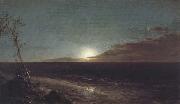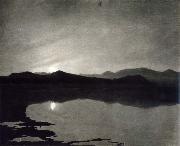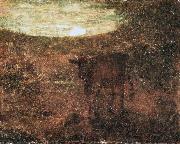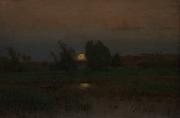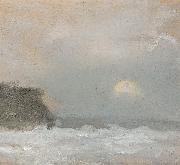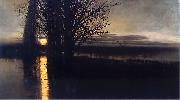Wholesale Oil Painting Reproductions No Minimum and Door to Door! |
|||||||||||
|
|
|||||||||||

|
|||||||||||
|
|
|
||||||||
All Frederic E.Church Oil Paintings |
||||||||
|
|
||||||||
|
|
||||||||
|
Artist Introduction: 1826-1900
American painter. He was a leading representative of the second generation of the HUDSON RIVER SCHOOL, who made an important contribution to American landscape painting in the 1850s and 1860s. The son of a wealthy and prominent businessman, he studied briefly in Hartford with two local artists, Alexander Hamilton Emmons (1816-84) and Benjamin Hutchins Coe (1799-1883). Thanks to the influence of the Hartford patron DANIEL WADSWORTH, in 1844 he became the first pupil accepted by Thomas Cole. |
||||||||
|
|
||||||||
|
Moonrise Painting ID:: 26224 |
mk48
January-March 1865
Oil on canvas
10x17in
Olana State Historic Site,New York State Office of Parks,Recreation and Historic Preservation. |
|||||||
Height Width |
INS/CM Quality |
|||||||
|
X |
| |||||||
|
|
||||||||
All William Stott of Oldham Oil Paintings |
||||||||
|
|
||||||||
|
|
||||||||
|
Artist Introduction: British , 1857-1900 |
||||||||
|
|
||||||||
|
|
Moonrise Painting ID:: 38950 |
mk142
1885
Oil on canvas
Untraced |
||||||
Height Width |
INS/CM Quality |
|||||||
|
X |
| |||||||
|
|
||||||||
All Albert Pinkham Ryder Oil Paintings |
||||||||
|
|
||||||||
|
|
||||||||
|
Artist Introduction: 1847-1917
Albert Pinkham Ryder Gallery
Albert Pinkham Ryder (March 19, 1847 ?C March 28, 1917) was an American painter best known for his poetic and moody allegorical works and seascapes, as well as his eccentric personality. While his art shared an emphasis on subtle variations of color with tonalist works of the time, it was unique for accentuating form in a way that some art historians regard as modernist.
After 1900, around the time of his father's death, Ryder's creativity fell dramatically. For the rest of his life he spent his artistic energy on occasionally re-working existing paintings, some of which lay scattered about his New York apartment. Visitors to Ryder's home were struck by his slovenly habits -- he never cleaned, and his floor was covered with trash, plates with old food, and a thick layer of dust, and he would have to clear space for visitors to stand or sit. He was shy and did not seek the company of others, but received company courteously and enjoyed telling stories or talking about his art. He gained a reputation as a loner, but he maintained social contacts, enjoyed writing letters, and continued to travel on occasion to visit friends.
While Ryder's creativity fell after the turn of the century, his fame grew. Important collectors of American art sought Ryder paintings for their holdings and often lent choice examples for national art exhibitions, as Ryder himself had lost interest in actively exhibiting his work. In 1913, ten of his paintings were shown together in the historic Armory Show, an honor reflecting the admiration felt towards Ryder by modernist artists of the time.
By 1915 Ryder's health deteriorated, and he died at the home of a friend who was caring for him. A memorial exhibition of his work was held in the Metropolitan Museum of Art in New York in 1918. While the works of many of Ryder's contemporaries were partly or mostly forgotten through much of the 20th century, Ryder's artistic reputation has remained largely intact owing to his unique and forward-looking style. Ryder was along with Thomas Hart Benton, David Siqueiros and Pablo Picasso an important influence on Jackson Pollock's paintings. |
||||||||
|
|
||||||||
|
|
Moonrise Painting ID:: 70890 |
ca. 1870(1870)
Oil on canvas
21.3 x 26.2 cm (8.39 x 10.31 in)
|
||||||
Height Width |
INS/CM Quality |
|||||||
|
X |
| |||||||
|
|
||||||||
All George Inness Oil Paintings |
||||||||
|
|
||||||||
|
|
||||||||
|
Artist Introduction: 1825-1894
George Inness Galleries
George Inness (May 1, 1825 -August 3, 1894), was an American landscape painter; born in Newburgh, New York; died at Bridge of Allan in Scotland. His work was influenced, in turn, by that of the old masters, the Hudson River school, the Barbizon school, and, finally, by the theology of Emanuel Swedenborg, whose spiritualism found vivid expression in the work of Inness' maturity. He is best known for these mature works that helped define the Tonalist movement.
Inness was the fifth of thirteen children born to John Williams Inness, a farmer, and his wife, Clarissa Baldwin. His family moved to Newark, New Jersey when he was about five years of age. In 1839 he studied for several months with an itinerant painter, John Jesse Barker. In his teens, Inness worked as a map engraver in New York City. During this time he attracted the attention of French landscape painter Regis François Gignoux, with whom he subsequently studied. Throughout the mid-1840s he also attended classes at the National Academy of Design, and studied the work of Hudson River School artists Thomas Cole and Asher Durand; "If", Inness later recalled thinking, "these two can be combined, I will try."
Concurrent with these studies Inness opened his first studio in New York. In 1849 Inness married Delia Miller, who died a few months later. The next year he married Elizabeth Abigail Hart, with whom he would have six children. |
||||||||
|
|
||||||||
|
|
Moonrise Painting ID:: 73237 |
oil on canvas, by the American artist George Inness. 20 1/4 in. x 30 1/2 in
cyf |
||||||
Height Width |
INS/CM Quality |
|||||||
|
X |
| |||||||
|
|
||||||||
All Clarice Beckett Oil Paintings |
||||||||
|
|
||||||||
|
|
||||||||
|
Artist Introduction: Australian Painter, 1887-1935,Australian painter. She studied at the National Gallery School, Melbourne (1914-16), and with Max Meldrum became involved (c. 1917) with the Meldrum circle of artists, which included Colin Colahan (1897-1987), Justus Jorgensen (1893-1975), John Farmer (b 1897) and Percy Leason (1889-1959). In 1919 she moved to the seaside suburb of Beaumaris, where she lived and worked for the rest of her life. |
||||||||
|
|
||||||||
|
|
Moonrise Painting ID:: 82321 |
oil on board, 18.5 x 21.0 cm, by Clarice Beckett
Date
cyf |
||||||
Height Width |
INS/CM Quality |
|||||||
|
X |
| |||||||
|
|
||||||||
All Aurelio de Figueiredo Oil Paintings |
||||||||
|
|
||||||||
|
|
||||||||
|
Artist Introduction: painted Girl at the piano in 1892 |
||||||||
|
|
||||||||
|
|
Moonrise Painting ID:: 97692 |
1884(1884)
Medium oil on canvas
Dimensions 124 x 220 cm
cyf |
||||||
Height Width |
INS/CM Quality |
|||||||
|
X |
| |||||||
|
|
||||||||
|
Prev Next
|
||||||||
|
|
||||||||
|
Related Paintings to Aurelio de Figueiredo :. |
||||||||
|
|
||||||||
|
CONTACT US |
